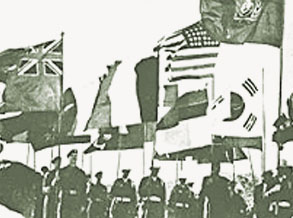The scale of the troops and supplies sent by the US for the Korean War was overwhelming compared to that of other countries. Because of the overwhelming scale of American troops and arms and logistic support, the US took the initiative in making operational decisions for the UN forces. When the UN Secretary General took the urgent situation that was being developed in Korea into consideration and urged the UN member nations to send troops to Korea on July 14, 1950, the number of participating nations greatly increased. However, most of the nations who promised to send troops were located geographically too far away, so it took more than two months for their troops to arrive in Korea.
Excluding the US, the first to promise military support was the British Common
wealth. The United Kingdom notified that they would send a special naval task force, and on July 29, Australia expressed their intention to send naval and air units. The Netherlands proposed to send destroyers, and Taiwan promised to send ground troops. However, the United States refused to accept Taiwan's proposal for political reasons. The US was afraid that the defense capabilities of Taiwan would be greatly undermined if Taiwan dispatched troops to Korea.
As the member nations of the NATO, England, France, the Netherlands, Belgium, and Luxembourg took strict precaution against the Soviet's desire to control Europe. Since the end of World War II, these countries had believed that the US should take on a bigger role in the NATO. When the Korean War broke out, they decided to fight with the US against North Korea with an expectation that, when they fight for the US, the US would make a substantial contribution to the NATO in return.
Canada, a member nation of the NATO and neighboring country of the US, judged that behind the North's invasion of South Korea, there was Soviet's desire of expansion. For this reason, Canada also decided to take part in the war to deter the Soviet's expansion and to reinforce alliances between allied nations including the United States.
Turkey and Greece were under constant pressure from those communist powers along the Balkan Peninsular and the Dardanelles Straits, and the Soviet Union was supporting these communist powers. Under the circumstance, Turkey and Greece were getting help from the United States in order to protect themselves from those communist powers. At the time of the Korean War, these two countries hoped that by aiding the UN in cutting off the expansion of communism in the Asian region, they would be able to get more military support from the US.
Australia and New Zealand were cautious about communists' expansion in the region of Southeast Asia. They also believed that fighting against the communists in Korea under the UN flag would be the best way to deter the expansion of communism.
Compared to Australia and New Zealand, the Philippines and Thailand took the threat of communists more seriously largely due to their geographical positions. At the time of the Korean War, the Vietnamese communists were expanding their powers with the support of China, and the communist rebel groups in the Philippines intensified their subversive activities during this period of time. In other words, the communist activities in Vietnam and the Philippines created a strong sense of threat in the minds of people living in the Philippines and Thailand.
Those countries located far away from Korea, such as Ethiopia, the Republic of South Africa, and Colombia in South America, also participated in the Korean War. When they decided to help Koreans in the war, these countries put a severe importance to the role of the UN.
Most countries who joined the UN forces during the Korean War were worried about the expansion of communism around them, and they saw the North's invasion of South Korea as a stepping stone for a more serious communist threat in the future.

21 Countries That Deployed Combat Units
